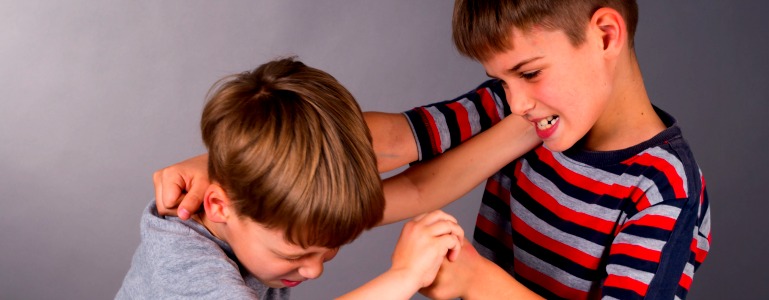You’re sitting relaxing for a few precious minutes before getting ready to make dinner, and you hear yelling echoing from the back of the house. You tear back there to find your child in what looks like a brawl with a sibling. Once separated you proceed to yell back in order to make clear your disapproval. Sound familiar?
Parents, teachers, and after school staff often feel as though the aggression they see surging from their children is always pure and simple in response to being mad. This may, in fact, be true some of the time. But, not always, and your response doesn’t always need to match their intensity to make a point. There are other ways to understand and manage aggression in your children.
One of the first things to remind ourselves is that aggression is innate in all of us. Biologists, anthropologists, and psychologists all agree on this fact. Child psychologists will tell you that play is a child’s way of communicating their experience of the world. They also use play, including play wrestling, to master developmental tasks and manage internal conflicts and worries. Expressions of aggression in these contexts are critical to a child’s development.
On the other hand, children who have difficulty controlling their aggressive behavior may be struggling in ways that need to be better understood. Often anxious reactions to situations are misinterpreted as pure aggression. Anxiety manifests in a surprising variety of ways, including aggression, in part because it is based on a physiological response to a threat in the environment. So while some children exhibit anxiety by moving away from the things that trigger fears, others react with an overwhelming need to break free from an uncomfortable situation. This behavior can easily be misread as anger and many children are feeling triggered during the pandemic.
It is always important to sit with your child following an outburst of any kind to help them calm down. Waiting until they are calm is a critical step in helping them to articulate their experience. If their brain and body are still in overload they will not be able to use their mind to explain what happened and apologize, if needed, with true remorse.
However, if you believe your child’s aggressive behavior falls outside of the bounds of normal developmental tasks and are not in reaction to transient anxiety producing situations, you might want to ask yourself these questions:
- Are they causing harm intentionally?
- Are they aware that their behavior is causing harm?
- Do they struggle with impulse control?
- Do they understand appropriate ways to communicate their needs?
If you answered yes to any of these questions, it might be helpful to consult with someone who can help you to help your child better understand and manage their aggressive behaviors. The Center for Children and Youth can help assess if your child is on track developmentally, struggling with anxiety or depression as a source of aggressive behavior, or if they are trying to manage other issues that feel out of their control. Schedule a consultation today!
Beth Berkowitz, Psy.D. is a Licensed Clinical Psychologist and Director of Children’s Clinical Services and Child Training Institute at Parents Place in San Francisco.



